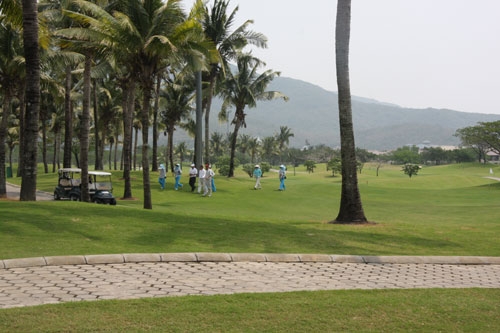Will golf become a mass sport in Hainan?
 |
|
The photo taken on April 19,2011 shows a typical golf course in Yalong Bay, Sanya City, Hainan Province.[Photo: CRIENGLISH.com/Zheng Zhi] |
Since the first golf course was built in the Chinese mainland in 1984, the game of golf has remained an expensive and elitist pursuit in the minds of many, and it is considered an exclusive pastime for the rich and privileged in China.
But in Hainan, China's southernmost and only tropical island resort, calls for more affordable golf or making golf a mass sport have grown loud.
According to Li Wenyong, a professor with Hainan University, the sound growth of the golf industry cannot merely rely on high-end customers, instead, more affordable golf services should be available.
Particularly after the Chinese government decided in 2010 to build Hainan into a top international tourism destination by 2020, the development of the golf industry is perceived as indispensable to this initiative.
Deborah Jiang, deputy general manager of Yalong Bay Golf Club in Sanya, thinks it is good for companies to provide more affordable golf services to the public.
"Making golf available and more affordable to the public, not exclusively to club members, may mean a reduction of our overall revenue, but it will bring us more profit because we are no longer targeting high-end customers, that means we may simplify luxury services, thus reducing costs."
In 2009, when golf was declared in Copenhagen an Olympic sport, Hainan opened its first public golf course ---IBL Golf Sports Club, which enjoyed government support in tax and charged far less than other golf clubs.
Many took this as Hainan's first step towards making golf a mass sport.
Ji Wenlin, mayor of Haikou, capital city of Hainan, said during a recent golf forum in Hainan that they were going to build Haikou into an international golf tourism destination and a capital of golf tourism in China in the next five years.
Despite the government's vigorous push for golf development, Jiang thinks the government should do more to promote the golf industry, such as lowering tax rates on golf clubs.
"Some golf clubs' manufacturers find it difficult to operate due to heavy tax imposed by the government, the tax rate stands at 20 percent against total revenue," Jiang said.
To make golf more accessible, Jiang thinks it is necessary for the government to lower the rate of hotels or even plane tickets, which have shunned people away from golf in Hainan.
"Actually, playing golf is cheap in Hainan. Normally, with 600 to 700 yuan ($90-107), you can play a game here, while in other places in China, it usually takes more than 1,000. But hotels in Hainan and air tickets to the island are expensive, especially in the peak travel seasons."
Jiang thinks that making golf a "mass sport" requires the government to better publicize the sport among the public and provide them with more know-how about this game.
With unrivalled climatic competitiveness, Hainan has long been an ideal destination for international golf lovers from Japan and Korea. But in recent years, the number of golfers from those countries has been declining.
Holding different views from Jiang, Hatai Mataichi, a Japanese adviser for Sanya China Travel International, thinks the current golf rate in Hainan may be a concern for Japanese golf lovers who are considering a tour.
"With 5,000 yen ($60) for one game, golf is cheaper in Japan than in Hainan, where a game usually costs 10,000 yen," Hatai said.
A lack of direct flights from Japan to Hainan may be another obstacle for Japanese golfers, according to Hatai.
Despite this, Hatai remains largely optimistic about Hainan's golf development and its potential for attracting international golf lovers.
"Hainan's favorable climate provides unrivalled competitiveness to its golf development, while in Japan, especially in the northern part, people are not able to play the game in the winter because of heavy snow. In terms of quality, Japanese golf courses are often artificially created, while in Hainan, courses are more natural, which are often built based on the natural shapes of the land."
 0
0 






